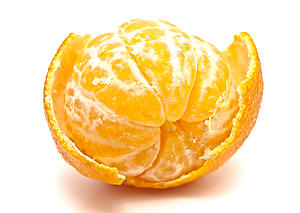 Several of my patients who have type 2 diabetes frequently ask me what’s new in the treatment of it. I’m happy to share some exciting news about an ingredient in tangerines called nobiletin that researchers are looking at as a possible prevention and treatment for the disease. If you’re concerned about controlling your blood sugar and preventing heart and liver complications that can accompany it, you’ll want to read this.
Several of my patients who have type 2 diabetes frequently ask me what’s new in the treatment of it. I’m happy to share some exciting news about an ingredient in tangerines called nobiletin that researchers are looking at as a possible prevention and treatment for the disease. If you’re concerned about controlling your blood sugar and preventing heart and liver complications that can accompany it, you’ll want to read this.
Nobiletin – An All Around Diabetes Fighter
Over the past several years, the natural health world has talked about flavonoids and what they can do for your health. Flavonoids are part of the “defense” system of plants – metabolites that protect them against fungi, pests, and predators. It’s thought that when you eat plant substances high in flavonoids that they confer some of this same defense protection to you.
Recently, more research has surfaced about a subclass of flavonoids called flavones. In particular, researchers are very enthused about the PMF (polymethoxyflavone) group that comes exclusively from certain citrus fruits (oranges and tangerines). Two of the most common PMFs are found in the peel, rind and flesh of tangerines – nobiletin and tangeretin – and a third, less common, sinensetin. Researchers at the University of Western Ontario have honed in on nobiletin for its amazing ability to do the following:
- Stabilize insulin levels: Fights insulin resistance in metabolic syndrome that can lead to type 2 diabetes.
- Protect against obesity: Lowers cholesterol by mobilizing and neutralizing blood fats so that they don’t result in fatty liver and atherosclerotic disease – two conditions that can accompany type 2 diabetes.
- Decrease inflammation: Studies reported in Biochem Pharmacol 2003 indicated that Nobiletin had anti-inflammatory effects similar to steroid drugs like dexamethasone. Inflammation is thought to be one of the most important underlying causes of major disease like cancer, Alzheimer’s, heart disease, diabetes, and joint disease.
- Antioxidant: Fights free radicals that lead to DNA damage.
In their study [Nobiletin Attenuates VLDL Overproduction, Dyslipidemia, and Atherosclerosis in Mice With Diet-Induced Insulin Resistance. Diabetes, 2011; DOI: 10.2337/db10-0589], two groups of mice were placed on the same western-type diet – high in fats and refined sugar. One group received the tangerine extract Nobiletin and the other did not.
The group that did not receive Nobiletin became obese and developed symptoms of metabolic syndrome (high blood sugar levels, elevated insulin production and resistance, high cholesterol) and a fatty liver. The group who did receive the Nobiletin did not develop the metabolic syndrome and did not develop a fatty liver nor did they gain weight. The researchers found that the Nobiletin stimulated their fat burning genes and inhibited their fat storing genes.
In longer studies, Nobiletin protected the animals against atherosclerosis – the buildup of fatty plaques in arteries that can lead to heart attack or stroke. The researchers concluded that, although it was too early to definitively know the human benefit from Nobiletin, these findings warranted further study as a suitable treatment for metabolic syndrome to prevent type 2 diabetes. Nobiletin also may be used to treat type 2 diabetes, control blood sugar and insulin levels, and prevent the complications – like atherosclerosis and fatty liver – that often accompany type 2 diabetes.
In other studies, Nobiletin was found to be neuroprotective in fighting memory loss and also fighting acne by inhibiting sebum production in the skin.
Citrus fruits are always a good addition to your diet. Yet, tangerines – particularly Clementine varieties – have much higher antioxidant levels than oranges and contain the health-containing flavone, Nobiletin, referred to above. They also contain a high level of Vitamin C and pectin fiber. Low on the glycemic index scale, containing only 53 calories, and 10 grams of carbohydrate, they can be safely eaten by diabetics in controlled portions. Although tangerine peels also contain Nobiletin, their bitterness makes them pretty much inedible. Better to concentrate on eating the entire fruit and lamelia – the fibrous white pithy tissue between the fruit – that also contains Nobiletin.
Tangerine peel (citrus reticulata) extract has been used for many years in Traditional Chinese Medicine (TMC) for the treatment of obesity and blood sugar regulation. There are a few herbal liquid tangerine peel extracts on the market, like DiaSlim that you may want to look into. You also may want to consult a TCM practitioner skilled in the use of tangerine peel extract.
To further help in the control of blood sugars, fight insulin resistance, and guard against fatty deposit buildups in liver and arteries, omit refined sugars from your diet. Also add good Omega-3 fats; eat phytonutrient rich fruits and vegetables and include a tangerine or two a day!
Stay Well,
Mark Rosenberg, M.D.
Tangerines Fight Obesity, http://www.sciencedaily.com/releases/2011/04/110406161030.htm
Nobiletin, Benefits, Dosage, Side Effects, esources.purematters.com/herbs-supplements/n/nobiletin
Nobiletin research, http://www.raysahelian.com/nobiletin.html
Nobiletin, http://www.phytochemicals.info/phytochemicals/nobiletin.php
Tangerines, http://www.nutrition-and-you.com/tangerines.html
